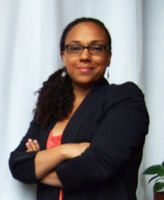
The newest faculty member in Notre Dame’s Department of Sociology originally planned to pursue a career in diplomacy. While studying in Cuba, however, Jennifer Jones came to the realization that the limitations of such a job would never satisfy her. “Diplomacy and state policy have a lot more to do with compromise than with trying to understand what’s happening on the ground,” she says.
Instead, Jones decided to pursue a career in research and teaching, with a focus on the ways in which immigration policies affect the experiences and identities of various minority groups in the United States. “I liked observing the dynamics around race in other countries and that got me interested in comparing race relations and how race works here,” she explains.
In addition to serving as an assistant professor of sociology, Jones will also join the College of Arts and Letters’ Institute of Latino Studies as a faculty fellow.
“The Institute for Latino Studies recently launched an aggressive faculty hiring program in cooperation with host departments to bring to the campus the best young academics working in Latino studies,” says José Limón, director of the institute and Julian Samora Professor of Latino Studies. Jones, he notes, is the first of these hires.
“Jennifer is an ideal bridge between sociology and the institute—and she is already attracting a great deal of attention for her cutting-edge research on contemporary race relations,” says Professor Rory McVeigh, chair of the Department of Sociology.
“We are really excited about what Jennifer brings to our department and to Notre Dame.”
Policy and Relationships
Jones, who is finishing a two-year postdoctoral fellowship at The Ohio State University, received her Ph.D. in sociology from the University of California, Berkeley, in 2011. Her dissertation focused on the experience of Mexican immigrants in North Carolina.
“I was interested to know how this population was shaping race relations there on the ground,” says Jones. “I look at relationships between blacks, whites, and Latinos, how changes in immigration policy have changed these relationships, and how Latinos understand these relationships.”
She is currently working on a number of articles on the emergence of local policy and inter-group relations. “In another project,” she adds, “I look at four different states that have instituted new immigration policies, asking why different states came up with different ways of dealing with immigration.”
Jones brings with her an already impressive list of accomplishments, including a National Science Foundation Dissertation Improvement grant and the 2012 Distinguished Contribution to Sociological Perspectives Award, which honors the best contribution to that journal during the previous two years. In 2012, the awards committee selected two articles as co-winners; the other was written by one of Jones’ new colleagues in the Department of Sociology—Assistant Professor Amy Langenkamp.
“We at the Institute could not be more delighted to welcome Jennifer Jones,” says Limón. “She wholly exemplifies the outstanding qualities we were seeking in our recruitments. We look forward to her arrival.”
Race and Social Justice
At Notre Dame, Jones will teach courses on both race and Latino studies. “I’m excited to be bringing my projects to Notre Dame and to get in the classroom,” she says.
“I think Notre Dame is a place where students have a strong social-justice orientation, which is the perfect environment for the study of sociology. I’m eager to work with students who are passionate about this that.”
Jones says she wants to influence her students as people, not just as thinkers.
“Education is to help students become better citizens in the world,” she says. “I hope to give them a better understanding of their social environment and how it’s come to be. That’s the underlying message through all my teaching.”
A Chicago native, Jones says she is also pleased to be able to bring her work closer to home—and to work with the faculty at Notre Dame in particular.
“The sociology department has a lot of depth and breadth, and there are opportunities for me to get feedback from other scholars,” she says. “There are also many incredible institutes affiliated with the department, and opportunities to work with scholars across the disciplines.”
Faculty in the Department of Sociology and Institute for Latino Studies are eager to begin working with Jones as well.
“We have been interested in developing race and ethnicity as a primary area of teaching and research in the department,” McVeigh says.
“Jennifer’s teaching and research will play a central role in helping us to reach that goal.”
Learn More >
- Department of Sociology
- Institute for Latino Studies
- Jennifer Jones faculty page
- Rory McVeigh faculty page
Originally published by at sociology.nd.edu on April 01, 2013.


